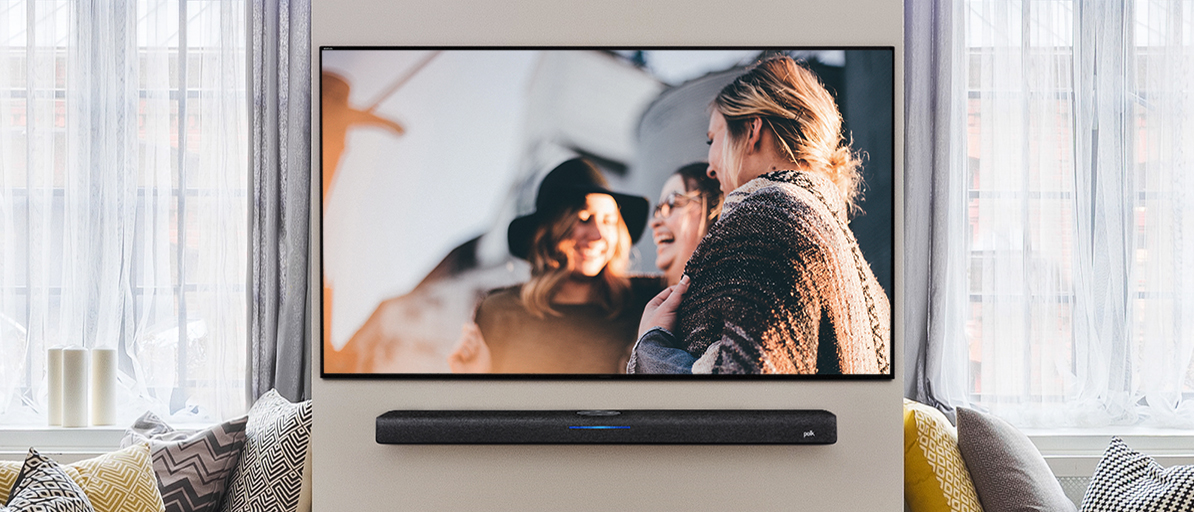TechRadar Verdict
There’s plenty to like about the Polk React. The wallet-friendly way it lets you add optional extra components in stages, for instance, plus its impressive built-in Amazon Alexa features and, especially, its ability to deliver a more clean, detailed, powerful, and film-friendly sound than you’d imagine possible from such a compact speaker. An HDMI loopthrough would have been nice, voices can sound a little detached from the onscreen action, and trebles can become slightly shrill at high volumes. Overall, though, the Polk React provides plenty of bang for not much buck - especially with the optional sub involved.
Pros
- +
Clean, aggressive, powerful sound
- +
Great value for what’s on offer
- +
Strong Amazon Alexa support
Cons
- -
Only one (eARC) HDMI port
- -
Voices lack upward dispersion
- -
No Dolby Atmos, DTS:X or Airplay 2 support
Why you can trust TechRadar
One-minute review
The Polk React soundbar hits the ground running with a stylish, compact design that manages to look cute, serious and neutral all at the same time. The rounded corners and huggable felt finish give it an almost soft look, in fact.
All thoughts of softness disappear when you fire it up, though. Despite only essentially being a stereo soundbar, the React can pump out a forceful sound capable of filling even large rooms with whatever film you’re watching.
It does this without any distortion in the bass or mid-range, too, despite having enough power and projection to make sounds appear to be coming from the sides of the room rather than only in front of you.
Detailing is excellent, and while bass is only solid if you buy the soundbar by itself, low frequency impact becomes really good if you add the optional React sub to your package.
Wider dispersion of vocals, more generous HDMI connectivity and a little more finesse with the highest trebles would have made the Polk React a cut-price classic. Even as it stands, though, it’s a great addition to the affordable/upgradable soundbar scene; especially if you’re looking for a soundbar to add to an existing Amazon Alexa system.
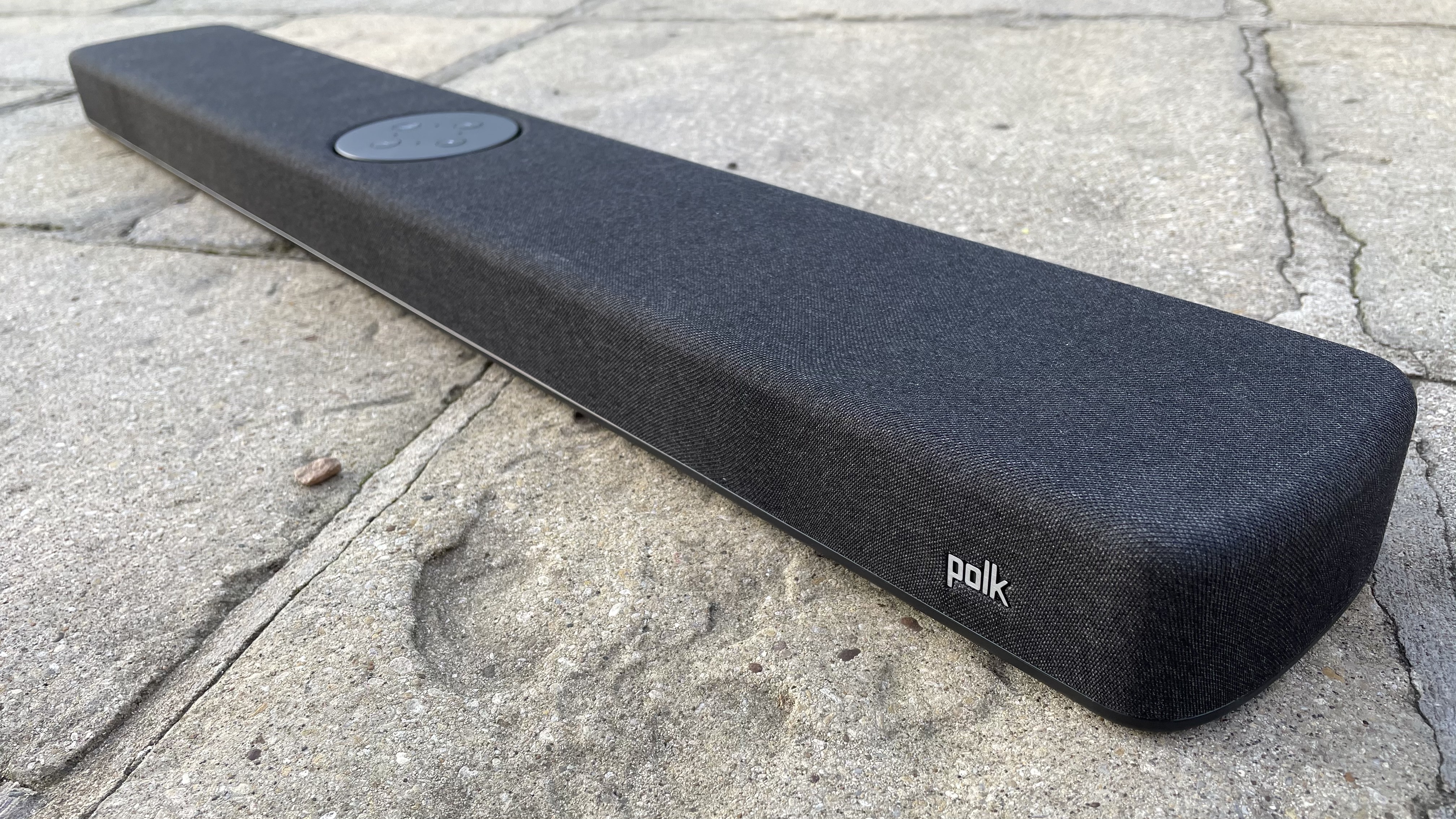
Polk React price and availability
- Widely available across the world
- Soundbar can be partnered with optional subwoofer and rear speakers
- React soundbar: $249 / £249 / AU$399; React Subwoofer: $179 / £149 / AU$369; Polk SR2 Surrounds: $179 / £159 / AU$219
Polk’s React soundbar, React Sub subwoofer and SR2 wireless rear speakers are available pretty much globally. What’s more, no matter where you buy them, they’re available at seriously affordable prices considering the power and sound quality they’re capable of delivering.
You’re looking at $249 / £249 / AU$399 for the soundbar alone, with the subwoofer costing $179 / £149 / AU$369, and rear speakers setting you back $179 / £159 / AU$219.
Suffice it to say that whether you go for the React soundbar alone or a full package with optional subwoofer and rears, the React system is seriously good value.
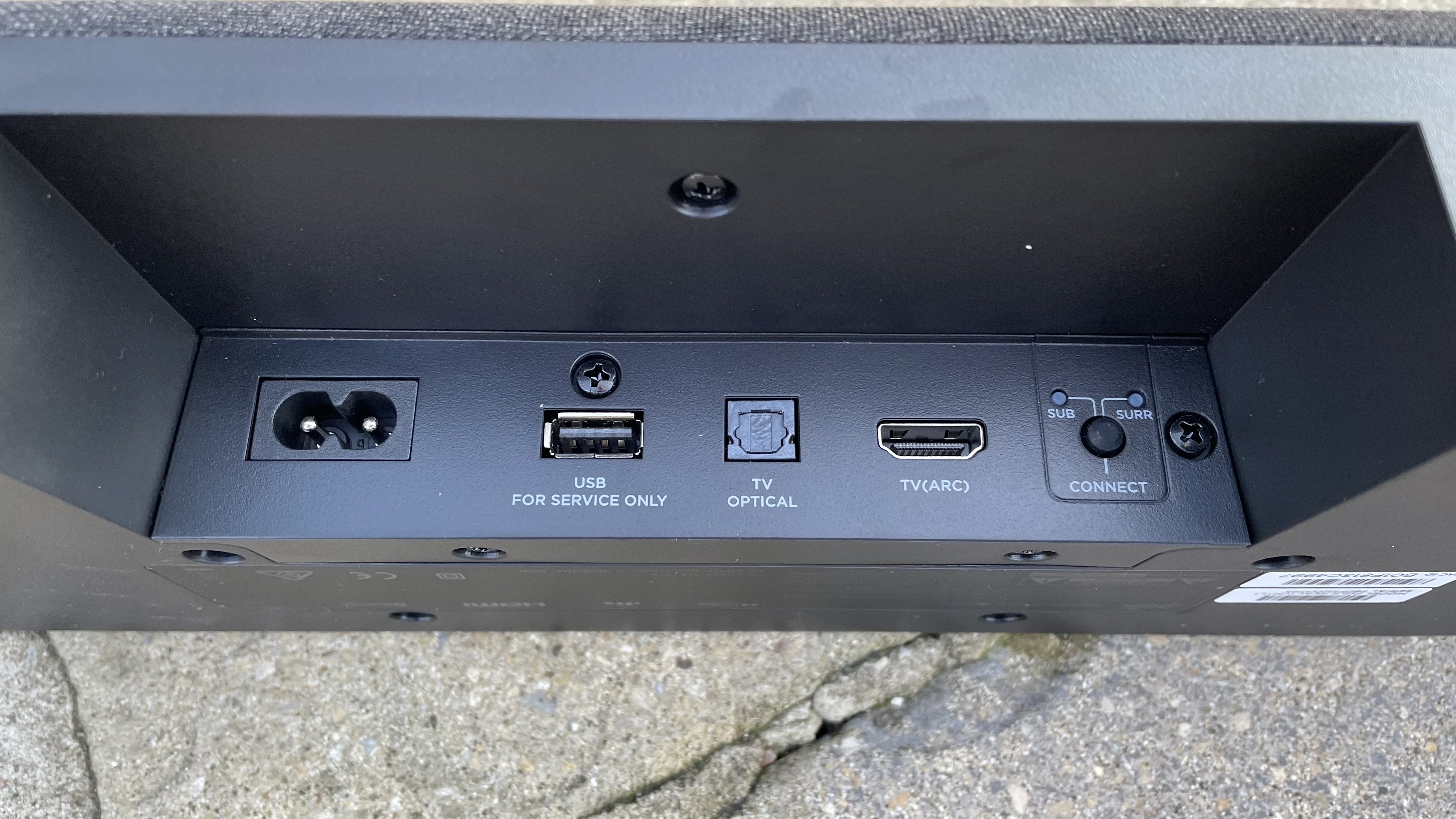
Design and features
- Available as a soundbar alone, or with optional subwoofer and rears
- HDMI eARC connectivity
- Main soundbar features two tweeters, two mid-range drivers and two passive bass radiators
The Polk React sells as a one-piece soundbar, but can be partnered with an optional wireless React subwoofer and wireless SR2 surround sound speakers if you want to add (much) more bass or create a more immersive soundstage. For the purposes of this review we tried the React soundbar with the React Sub.
The soundbar looks very cute. Its smallish form (864(w) x 121(d) x 57(h)mm) should slot handily under most of 2021’s TVs, and it’s just the right size, too, to partner a wide range of TV screen sizes without looking out of proportion.
Its rounded ends give it a comfortable, homely feel, as does the dark cloth covering its front, side and top edges. The React soundbar ships with a template you can use to help wall mount it if you’re looking for a compact soundbar to accompany a wall-mounted TV.
The top of the soundbar sports a stylishly large circular panel containing basic button controls should the small but thoughtfully designed remote control not fall readily to hand.

The soundbar doesn’t carry a display in the usual sense of the term. Instead a thin LED strip near the top of the front edge changes colour to tell you what Alexa is up to, while a separate small colour-coded Status LED light tells you what the soundbar’s doing. For instance, if the Status LED light is purple you’re in Night Mode; if it’s yellow then the soundbar is receiving DTS Audio; and if it’s green Dolby audio is being received.
A proper readout telling you what’s going on would be easier, in truth. But if it turns out Polk has sacrificed the luxury of a proper display in the quest for great sound quality at an affordable price, so be it.
The subwoofer is also quite cute in a large, chunky, subwoofery kind of way. It sports a matching all-over felt covering, with a bold Polk logo on the top and a hefty driver pointing down from a bottom edge that’s raised an inch or so off the floor by stylishly integrated feet.
The soundbar’s connections are a little disappointing - especially the provision of just a single HDMI port. This needs to be attached to your TV’s ARC/eARC HDMI port if it has one, so that audio from whatever’s being watched on the TV can be passed through to the soundbar. As a result, there are no other HDMI inputs available on the soundbar for attaching/looping through other external HDMI sources.
Only supporting HDMI-carried sound via ARC also means your TV must be able to pass Dolby and DTS audio formats on to the soundbar if you’re to get the best results from all sources, and we’ve seen plenty of examples of ARC causing audio sync issues with some sources (though we should add right away that we did not experience this issue during the time we spent testing the Polk React).
Our guess is that not carrying any HDMI inputs means the React can sidestep the tricky questions faced by soundbars with HDMI loop-through over whether that loop-through supports Dolby Vision, HDR10+ and the latest 4K at 120Hz video feeds now available from the latest consoles and PC gaming devices.
The only other ports on the Polk React soundbar are a USB input that’s only there for service/firmware use, and an optical audio input. The soundbar does carry both Bluetooth and Wi-Fi wireless connectivity, including Spotify Connect streaming, but there’s no support for Chromecasting or Airplay 2.
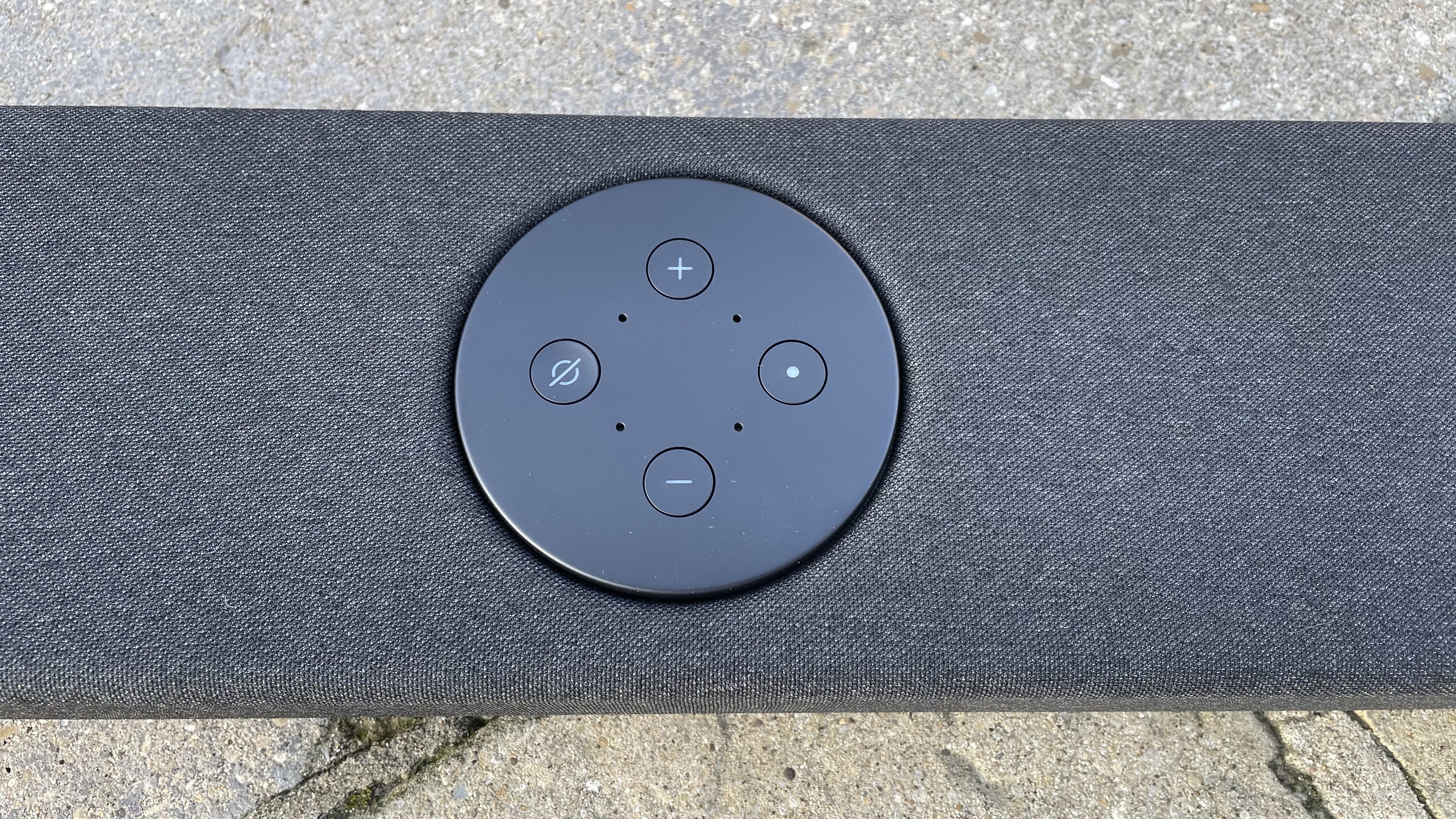
The main React soundbar’s configuration features two 25mm tweeters, two mid-range drivers, and a pair of 110 x 100mm passive radiators for bass. There’s no great push for huge numbers of ‘real’ audio channels here; while the soundbar can handle Dolby Digital and DTS 5.1 sound, its output is just stereo unless you add the optional rears and subwoofer. Since the React is not designed to handle Dolby Atmos or DTS:X, just Dolby Digital and DTS 5.1, there are no height effects.
Anyone disappointed by the lack of Atmos and DTS:X support should remember the core React soundbar’s very affordable price. For that sort of money it’s not reasonable to expect channels galore.
The subwoofer, if you add it to the package, sports a sizeable seven-inch woofer, and is connected to the soundbar via a pretty straightforward pairing button located next to the HDMI port.
Aside from hopefully offering an upgrade from your TVs sound, the React’s biggest attraction is its support for Amazon Alexa voice recognition - complete with four built-in far-field mics. Alexa is so well integrated, in fact, that the speaker essentially works as a (great-sounding) Amazon Echo, and can even become part of a fully integrated Alexa Multi-Room system and control your other smart home devices.
The soundbar speaks to you in those familiar Alexa tones as soon as you switch it on, guiding you through basic set up steps in a friendly and effective manner.(We were impressed, too, by how well the soundbar picked up our plaintive cries of ‘Alexa!’ even in the midst of playing raucous action scenes at foolishly loud volumes.)
The final Polk React features of note are its provision of four themed sound presets (Night, Music, Sport and Movies), and a Voice Adjust option that adds emphasis to vocals if you’re struggling to pick them out of a dense mix. We like to call this the ‘Tenet’ mode.
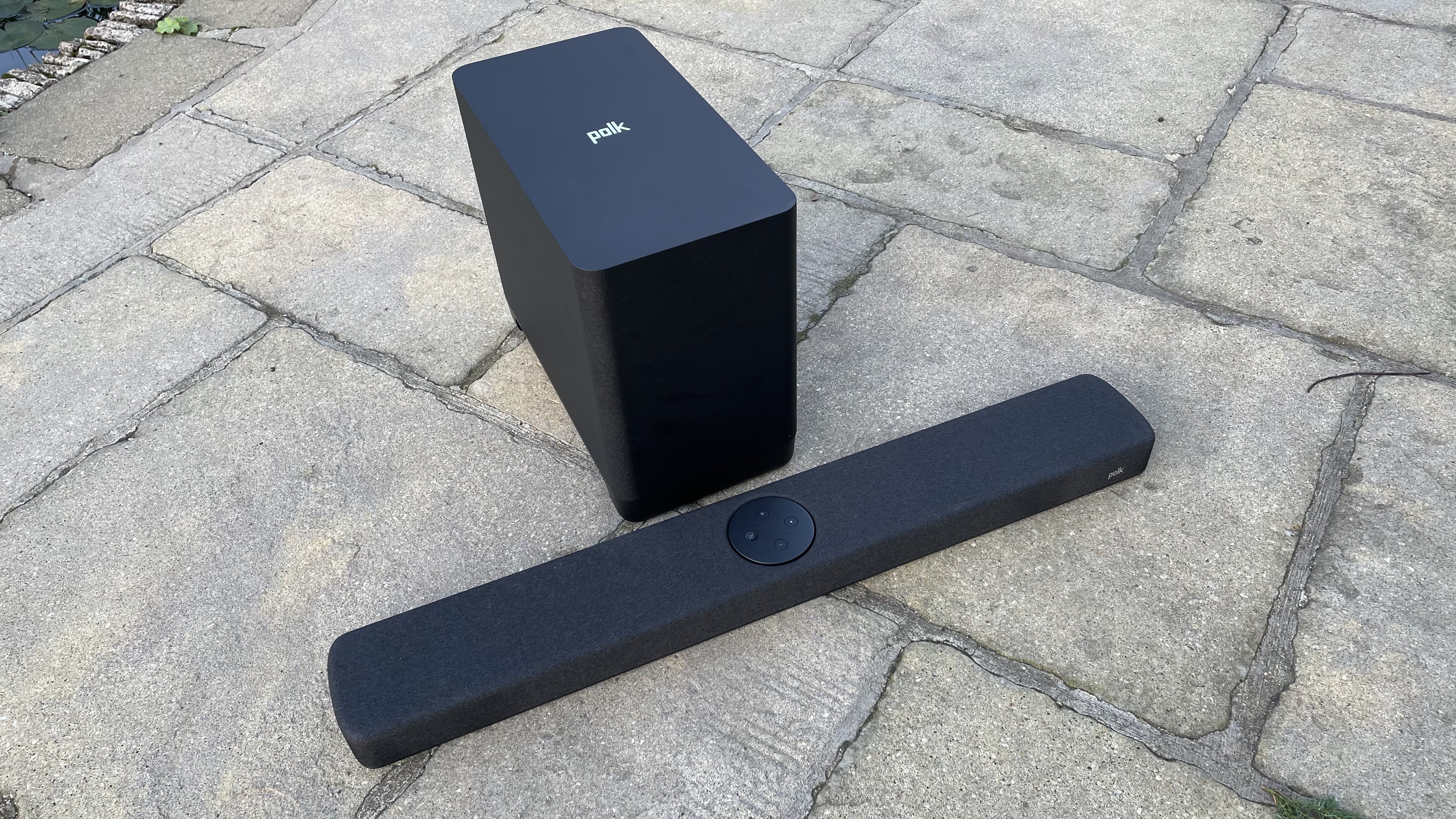
Audio performance
- Powerful and aggressive presentation
- Creates a surprisingly large and forward soundstage
- Adding the subwoofer is highly recommended
Starting our tests with just the soundbar, the first things we noticed were how big a sound field it can project, and how pleasingly aggressive it sounds with film soundtracks.
The scale of its sound comfortably filled a mid to large-sized room, and while we wouldn’t go so far as to say that we heard any sound effects coming from behind us, we could clearly hear sound activity going on to our left and right sides. This activity wasn’t just vague ambient effects either; the side sounds contained levels of detail and specificity beyond anything you’d imagine possible from such a small and affordable soundbar.
The fact that we were hearing sounds to our left and right side rather than just all in front of us proves that the React is unusually good for its money at propelling sound aggressively forward into your room.
The sound’s projection is backed by plenty of power, too. Polk doesn’t specify power ratings for the React, but there’s nothing about the maximum volumes it can attain or the cohesiveness of its soundstage that suggests any deficiencies with any of the drivers. On the contrary, the React’s presentation seems expressly tuned to deliver punchy, dense film soundtracks, hitting hard with impact sounds, and escalating cleanly and powerfully as big movie scenes build to a crescendo.
Dialogue is kept locked at the center of the soundstage, too, and always remains crystal clear; so much so that we hardly ever felt the need to use the Voice Adjust option.
Bass from the React soundbar is a little limited without adding the subwoofer. But what’s there is at least delivered without phutting or other distortions, and without overwhelming any other aspects of the mix.
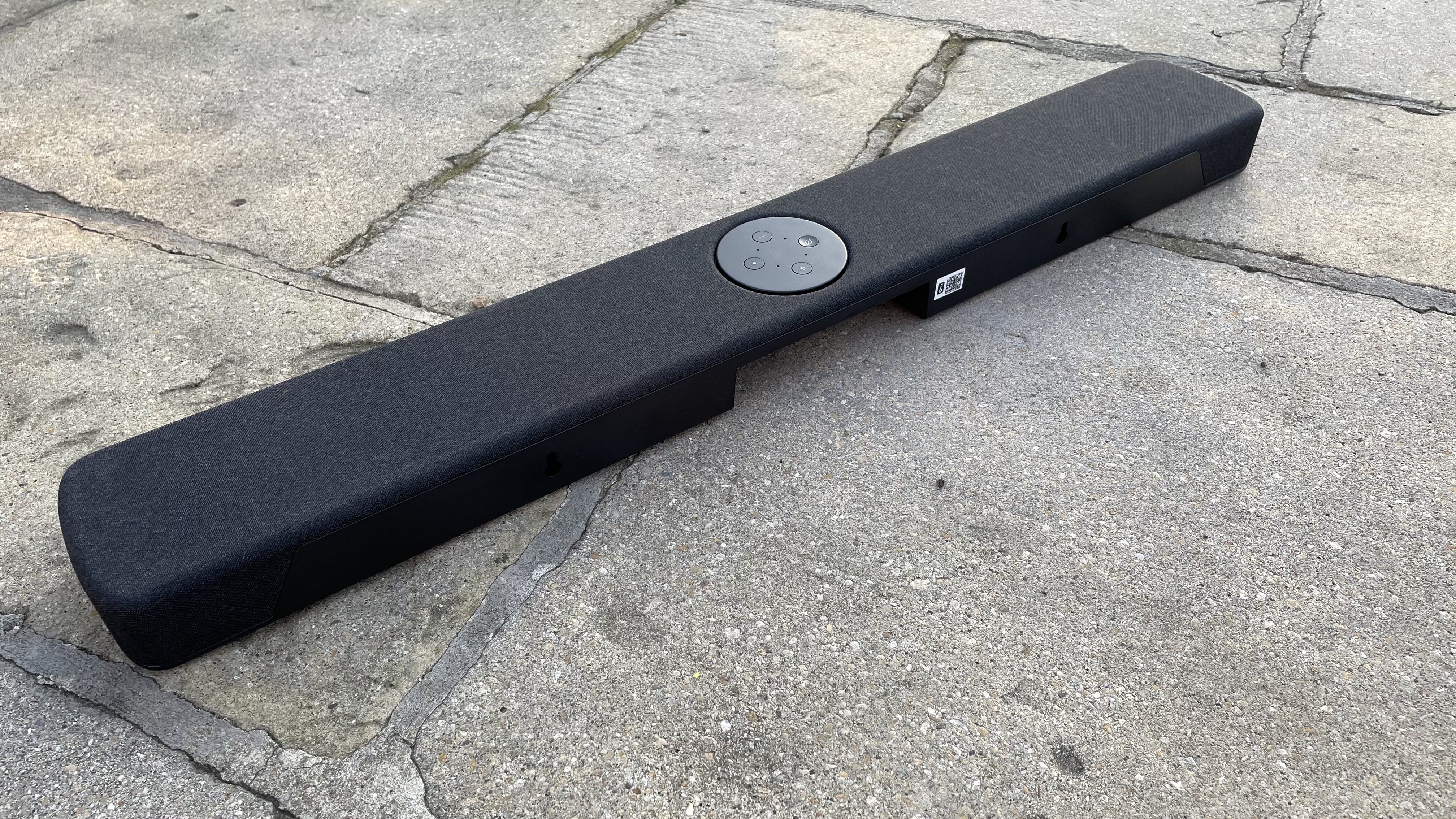
There are, though, a couple of niggles with the React’s sound. The first is that, while dialogue is always clear, it can sound rather locked into the soundbar, with the result that voices seem to be a little dislocated from the picture. This is alleviated to some extent by a low seating position, so that you are sitting slightly below the line of the soundbar and screen, or by slightly angling the soundbar up. It’s certainly not an ideal situation, though.
The other issue is that, at high volumes, treble effects in dense movie moments can become a bit harsh. Not enough to make you wince, but enough to draw undue attention to treble effects and make you suddenly aware that the React has a definite treble ‘ceiling’.
The React isn’t quite up there with the very best soundbars when it comes to playing music. Its tone is just a touch clinical for most genres. Its music performance does still sound clean and detailed, though, as well as nicely balanced when it comes to its blend of low and high frequencies. The mid-range is open and compelling, too, and the React’s approach to vocals is also better suited to music than movies. After all, with music it doesn’t matter if vocals sound dislocated from your TV screen.
Adding the subwoofer to the React soundbar makes a big difference. It hugely expands the range of bass the system can produce, taking the impact and drama of big action movie moments to a whole new level.
It can get seriously deep without distorting or dropping out, yet tonally it feels expertly matched to the main soundbar, never overwhelming it or feeling unnaturally sonically detached from it.
It’s perhaps not the nimblest bass sound I’ve heard, but it’s easily accomplished enough to class as, for me, a more or less essential addition to the React Soundbar. Even if you can only afford the soundbar by itself at first and need to save up longer for the subwoofer.
Should I buy the Polk React?
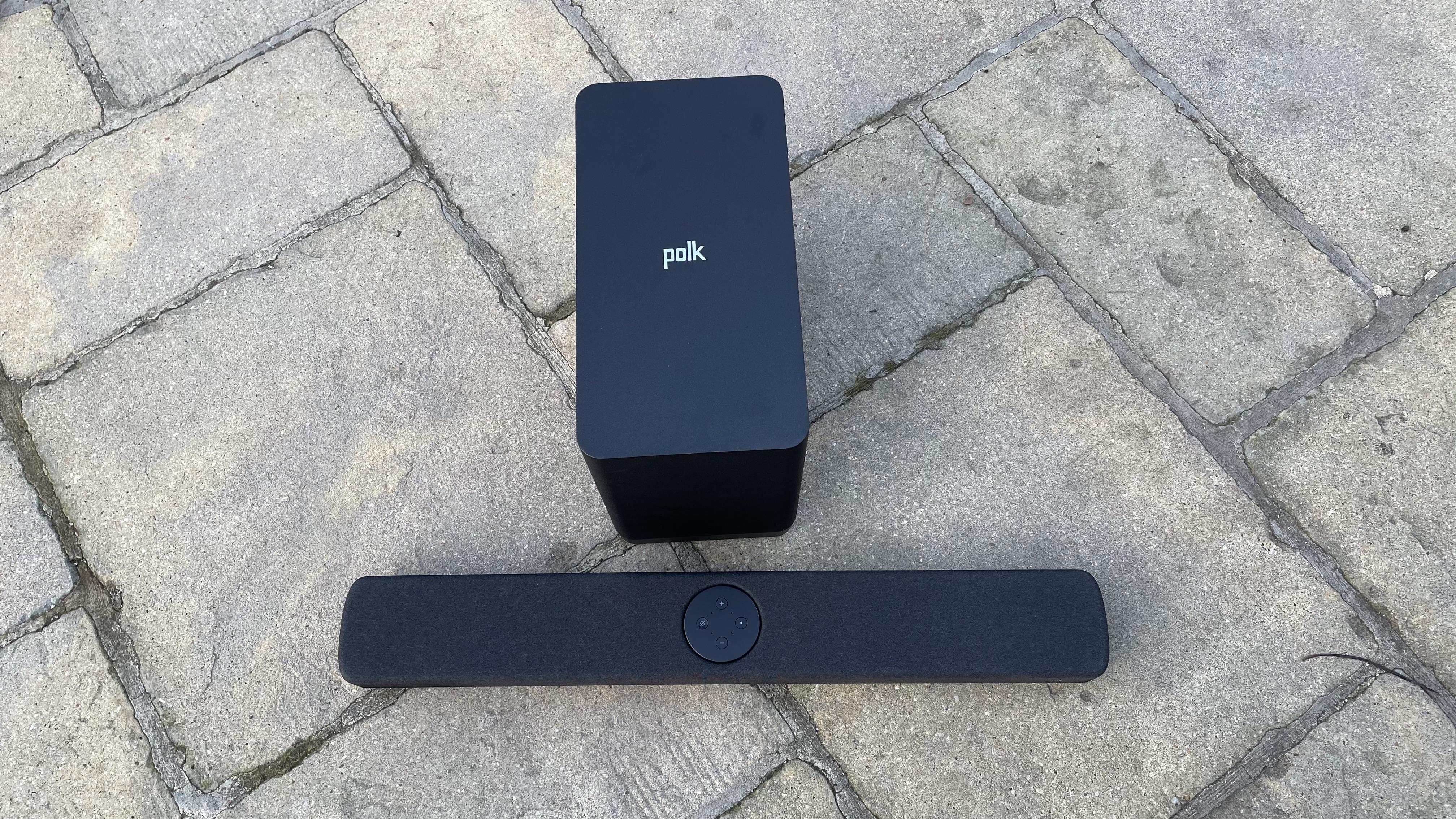
Buy it if...
You want a lot of sound for your buck
Even without any of its optional extras, the Polk React delivers a loud, aggressive and surprisingly immersive sound.
You want to build your system up over time
If money’s tight, one of the nice things about the Polk React is that you can start with the already decent soundbar and add a subwoofer and rears separately as funds allow.
You’re an Alexa household
The React’s built-in Alexa support and ability to become part of a wider network of Alexa devices will be a boon to households already well populated by Amazon devices.
Don't buy it if...
You want to hear proper Dolby Atmos or DTS:X
The React doesn’t carry any up-firing speakers, and only plays Atmos and DTS:X sources in their Dolby Digital and DTS 5.1 ‘cores’.
You have a very big TV or you sit quite high relative to the soundbar
Vocals can sound rather dislocated from the onscreen action if the soundbar sits below your viewing head height
You want multiple HDMI inputs/loopthrough
The only HDMI port on the React is an output that can also take DTS or Dolby Digital audio passed through to it via eARC from a compatible TV; you can’t loop external sources through the soundbar.
- Looking for more? Read our guide to the very best soundbars you can buy today
John has been writing about home entertainment technology for more than two decades - an especially impressive feat considering he still claims to only be 35 years old (yeah, right). In that time he’s reviewed hundreds if not thousands of TVs, projectors and speakers, and spent frankly far too long sitting by himself in a dark room.
